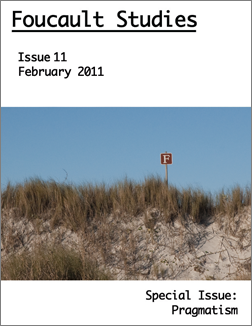Criticism without Critique: Power and Experience in Foucault and James
DOI:
https://doi.org/10.22439/fs.v0i11.3204Abstract
Through an analysis of philosophical temperaments, I argue that both William James and Michel Foucault believed the central task of philosophy not only to be the generation of new ideas or ways of thinking, but also to create new temperaments, new ways of inhabiting the world. Though James and Foucault in many ways agree on the ends of philosophy, the methods and strategies that they developed differ according to the problems with which each philosopher was concerned. Although James gives a rich account of what it means to see philosophy as the reconstruction of temperament, Foucault’s genealogical method explains concretely how temperaments might be reconstructed through the use of history. Raising questions of how this work might effectively continue today, I argue that Foucauldians and Jamesians, Continental philosophers and American pragmatists, might find common cause in exploring the production and reconstruction of democratic temperaments in response to social problems.Downloads
Published
2011-02-01
How to Cite
Edmonds, J. S. (2011). Criticism without Critique: Power and Experience in Foucault and James. Foucault Studies, (11), 41–53. https://doi.org/10.22439/fs.v0i11.3204
Issue
Section
Special Issue on Foucault and Pragmatism
License
Authors retain copyright to their work, but assign the right of the first publication to Foucault Studies. The work is subject to a CC BY-NC-ND 4.0 license, but despite these restrictions, authors can take for granted that Foucault Studies will permit articles published in Foucault Studies to be translated or reprinted in another format such as a book providing a full reference is made to Foucault Studies as the original place of publication.



